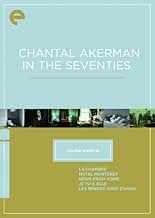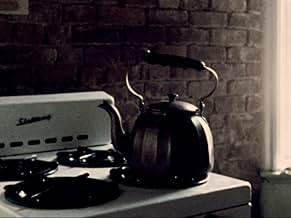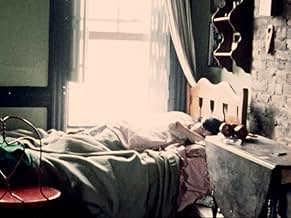La chambre
- 1972
- 11 min
Adicionar um enredo no seu idiomaIn a 360° circular panoramic shot the camera slowly pans an entire apartment (or house). When it first passes the bedroom there is nobody there but each time it shows the room again Chantal ... Ler tudoIn a 360° circular panoramic shot the camera slowly pans an entire apartment (or house). When it first passes the bedroom there is nobody there but each time it shows the room again Chantal Akerman is sitting on the bed, motionless first, then busy doing something (peeling an ora... Ler tudoIn a 360° circular panoramic shot the camera slowly pans an entire apartment (or house). When it first passes the bedroom there is nobody there but each time it shows the room again Chantal Akerman is sitting on the bed, motionless first, then busy doing something (peeling an orange, eating an orange, etc.). When she is last seen she yawns and lies down on her bed. Th... Ler tudo
- Direção
- Roteirista
- Artista
Avaliações em destaque
The 360-degree counter-clockwise panning around the room shot seems like a riff out of Michael Snow's experimental bag of tricks, but is not as interesting as his breakthrough films, notably WAVELENGTH.
Instead we have the gimmick performed a half dozen times, then suddenly changing to a back & forth pan right to left, left to right, over & over until arbitrarily stopping.
Like Warhol's more famous and interminable earlier experiments in this form, the duration becomes the issue in watching this. The purpose of Chantal's approach is to force one to examine details, in this case the unchanging topography of the chamber, and of course the expected (or shaggy-dog not to expect) movements of Chantal herself as the human element submerged in the room. It's just like watching the sleeper in Warhol's SLEEP occasionally budge, with minimal pleasure or anything else to be derived from the effort.
My interest in cinema over the years has focused more on maximalism -I would rather see Abel Gance, Sacha Guitry or Ken Russell toy with the medium than observe the minimalists and structuralists like Chantal and more recently the idiotic dogme crew spinning their wheels. As a parting shot, my all-time favorite, using elements really from both camps is Bert Haanstra, whose feature DR. PULDER SOWS POPPIES reminds us that subtlety is not dead, even in a modern era where gimmicks have trumped conventional dramatic narrative.
As I said, Chantal Akerman is a filmmaker I highly respect, and I've loved some of her feature films, but her shorts are pretty disappointing. The other Akerman short film I've seen is "Saute ma ville", which I disliked a bit more.
Is it bad? Not necessarily. But it is just completely empty of anything, other than a very interesting technique.
We see Ackerman in bed. She's in a different pose each time. Sometimes she's eating an orange. That's the plot. (Of course, there must be a plot if there's a writer.)
Chantal Ackerman was a great director. This movie is important as her first film. It was interesting in its way, but it's not something that everyone would enjoy. The film has an IMDb rating of 6.0. I rated it 7.
One of Akerman's more low-key, experimental shorts is La chambre, which comes packaged in The Criterion Collection set of Akerman's most renowned work in the 1970's. It's an exercise in cinematic craft in the way it has Akerman practices the conventional, but elaborate pan in film, which consists of a camera turning horizontally, often to showcase an all-encompassing view of a room or a specific location, three-hundred and sixty degrees. La chambre pans in Akerman's bedroom, where every time the camera passes her, she is in a different position on her bed. At one point, she is motionless, whereas the next, she is peeling an orange, and finally, at the end of this ten minute work, she's lying on the bed, though doesn't appear to be sleeping.
This will undoubtedly be a baffling little oddity for those brave and willing enough to seek it out, but Akerman likely doesn't mean a lot of thematic depth or significance with this short, other than the fact that it's a light-hearted showcase of the effectiveness of a camera pan. Because there is no dialog, let alone sound, viewers have to resort to picking up on the fine details and intricacies of Akerman's room, which bears rocking chairs, clutter, and years worth of accumulated treasures that make for great details. La chambre isn't much other than a piece of experimentation, but it's far less taxing than most of the genre's works normally are.
Directed by: Chantal Akerman.
Você sabia?
- Curiosidades'La chambre' exists in two versions. 'La chambre 1' is silent whereas 'La chambre 2' has a soundtrack.
Principais escolhas
Detalhes
Contribua para esta página





















